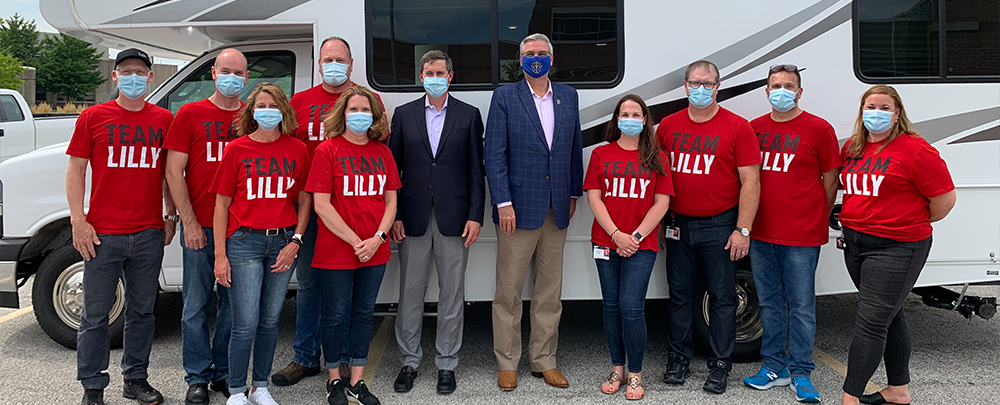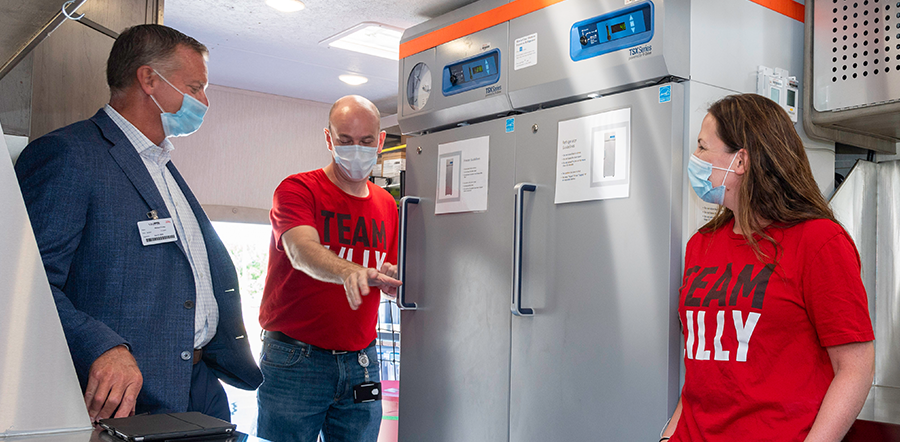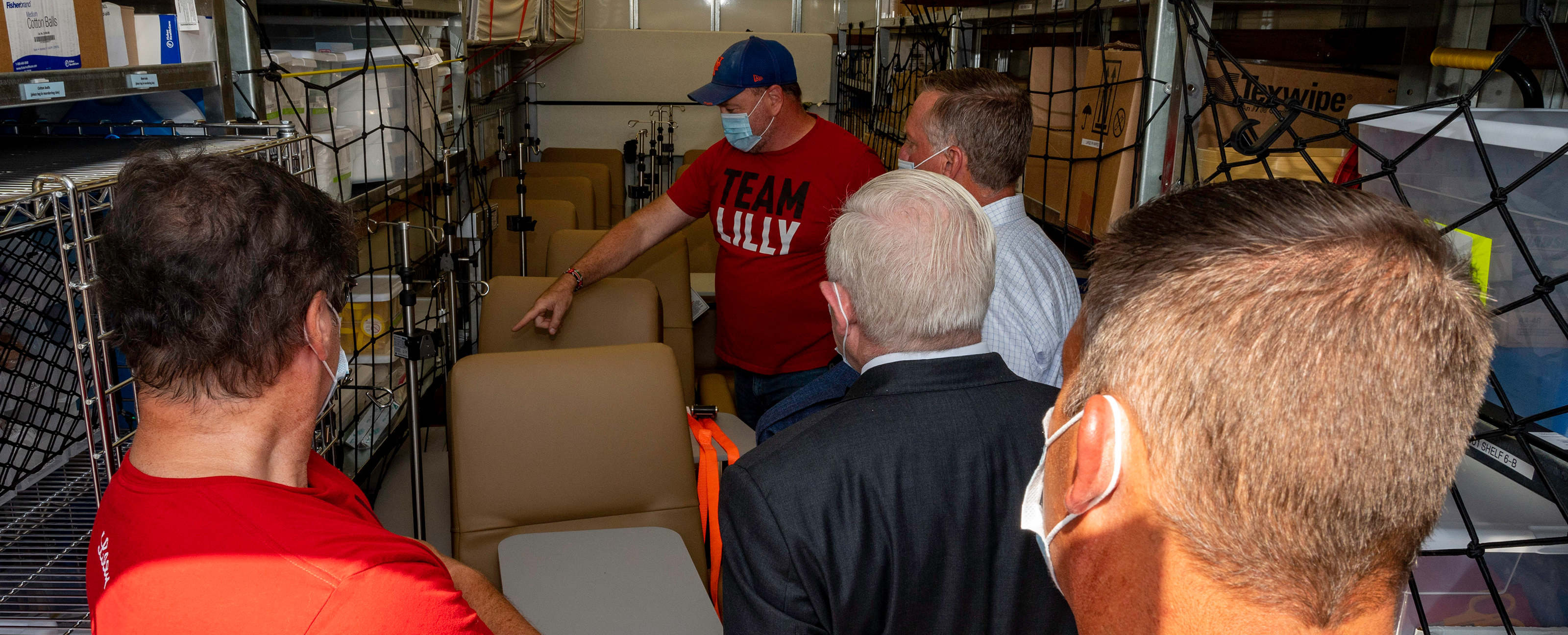Lilly Creates Mobile Research Units to Reach Elderly Patients
August 3, 2020 Posted by: Eli Lilly and Company

In record time, Lilly scientists have gone from identifying, developing and testing antibodies as potential treatments for COVID-19 patients.
But the speed of our COVID-19 innovation isn’t just happening in labs.
Recently, Lilly – with the help of two other Indiana-based companies – quickly turned an idea to conduct clinical trials for elderly patients into a reality.
Nursing home residents have been an especially vulnerable population since the pandemic began. In fact, more than 40% of COVID-19 deaths in the U.S. have been at long-term care facilities.
Given COVID-19’s devastating impact, Lilly’s senior vice president and chief scientific officer Dan Skovronsky, M.D., Ph.D., knew it was critical to include the elderly population in our research studies.
There are obstacles to conducting a clinical trial during a pandemic, but studying elderly patients in this setting posed a new challenge.
Long-term care facilities aren’t traditional locations for clinical trials, which typically take place in hospitals, universities, doctors’ offices and community clinics. And facility lockdowns, patients’ physical mobility restrictions and other factors make it difficult for elderly people to visit existing trial sites.
So Lilly decided to bring the clinical trial to the patient.
Inspired by mobile medic clinics, modular clinics and bloodmobiles, a team of Lilly clinical development, clinical supply and engineering experts immediately began brainstorming.
Late one night, the idea emerged: What if Lilly converted a recreational vehicle (RV) into a mobile research unit?
“It truly was one of those light-bulb moments for the team, and we immediately went to work to transform the idea into a reality,” said Janelle Sabo, PharmD, Lilly clinical development leader for the COVID-19 antibody portfolio as well as Lilly clinical innovation, systems and supplies.
Lilly identified a Coachmen RV model that would work for our idea and reached out to the Indiana-based company. Coachmen called dealerships across the country and got the vehicles delivered to Indianapolis within days.

Lilly employees show Coachmen RV CEO Michael Terlep the inside of the renovated RV now used as a mobile research unit.
Once Lilly received the RVs, it was time to customize them. We partnered with another Indiana-based company, Poynter Sheet Metal Inc., to convert the RVS into “clinical research units on wheels.”
Poynter removed the traditional interior of the RV, including cabinets, the dining table, beds and storage. They installed customized storage solutions for equipment, laboratory space and clinical trial material preparation, including custom controlled-temperature storage and monitoring.
But we still needed to transport all the supplies necessary for on-location clinical research. So Lilly customized trailer trucks to follow the RVs with everything principal investigators need to conduct a clinical trial at a long-term care or assisted-living facility.
Incredibly, the time it took to bring this from idea to reality was only 30 days.
“We’re working as fast as we can to create medicines that might stop the spread of the virus to these vulnerable individuals,” Skovronsky said. “It’s not easy to conduct clinical trials in this setting, but we’re taking on the challenge in an effort to help those that need us most.”

Lilly employees show Michael Terlep, Coachmen RV CEO; Joseph Lansdell, Poynter Sheet Metal, Inc. CEO; and Jim Schellinger, Indiana Secretary of Commerce, around the renovated trailer truck used for clinical trial supplies.
Now, Lilly’s mobile research units (MRU) can easily deploy to COVID-19 outbreaks at long-term care facilities across the U.S. as part of the Lilly-sponsored BLAZE-2 study.
The first-of-its-kind COVID-19 trial is being conducted in partnership with the National Institute of Allergy and Infectious Diseases (NIAID), the COVID-19 Prevention Network, and several long-term care facility networks across the country.
The study will enroll residents and staff who live or work at facilities that have had recently diagnosed cases of COVID-19 and are now at a high risk of exposure.
“We wanted to make sure the patient experience was front and center,” Sabo said. “This is such a unique situation for so many patients, many of whom have been isolated from family and loved ones.”
Lilly’s purpose – to make life better – has never been more important. We are proud to bring this vision to life, and grateful for Coachmen and Poynter Sheet Metal, Inc.’s support to truly make this a Hoosier effort to help patients across the country.
“Our team was honored to be a part of this project,” Sabo said. “Working with other Hoosiers to transform our vision and potentially help patients across the country made it all the more special.”
Clinical investigators, hospitals or clinical sites interested in participating in one of Lilly’s clinical trials for a potential COVID-19 treatment should call 1-877-CT-LILLY (1-877-285-4559) or email [email protected].
Patients interested in participating in one of Lilly’s clinical trials for a potential COVID-19 treatment should visit Lilly Trials for information regarding eligibility for ongoing trials.